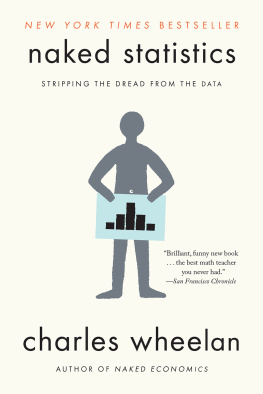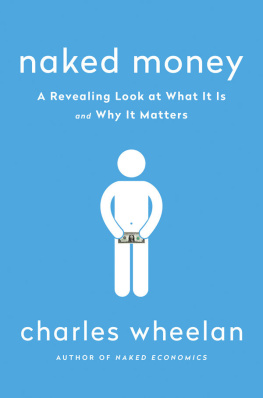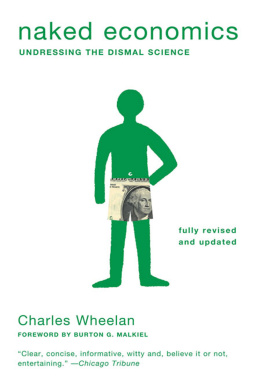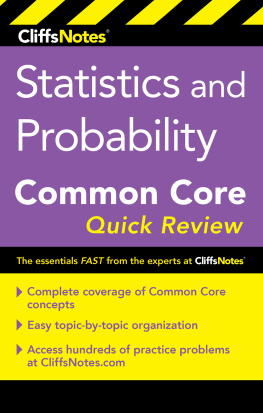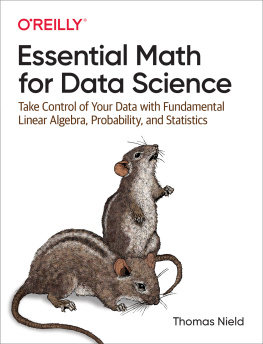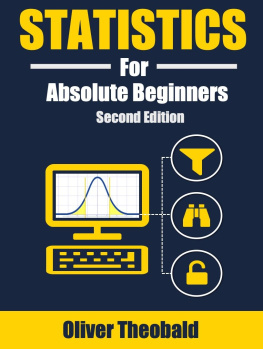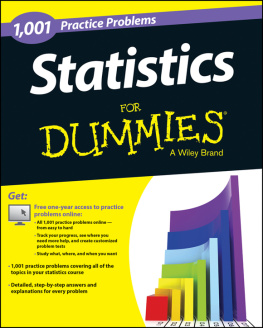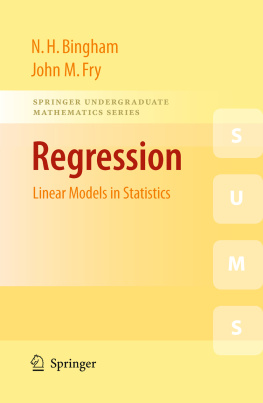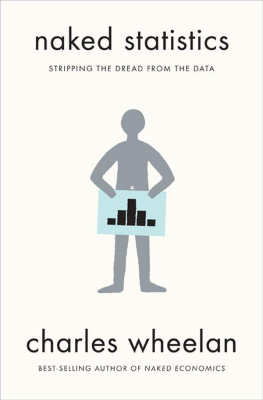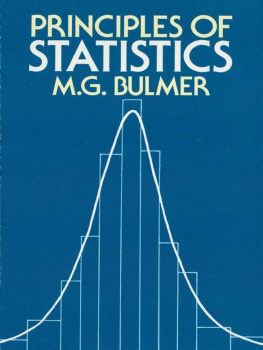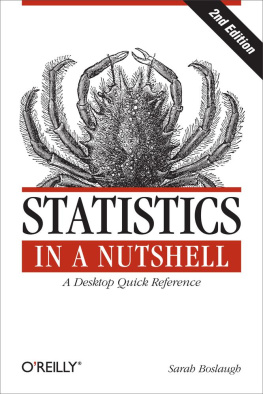
naked statistics
Stripping the Dread from the Data
CHARLES WHEELAN

For Katrina
Contents
I have always had an uncomfortable relationship with math. I dont like numbers for the sake of numbers. I am not impressed by fancy formulas that have no real-world application. I particularly disliked high school calculus for the simple reason that no one ever bothered to tell me why I needed to learn it. What is the area beneath a parabola? Who cares?
In fact, one of the great moments of my life occurred during my senior year of high school, at the end of the first semester of Advanced Placement Calculus. I was working away on the final exam, admittedly less prepared for the exam than I ought to have been. (I had been accepted to my first-choice college a few weeks earlier, which had drained away what little motivation I had for the course.) As I stared at the final exam questions, they looked completely unfamiliar. I dont mean that I was having trouble answering the questions. I mean that I didnt even recognize what was being asked. I was no stranger to being unprepared for exams, but, to paraphrase Donald Rumsfeld, I usually knew what I didnt know. This exam looked even more Greek than usual. I flipped through the pages of the exam for a while and then more or less surrendered. I walked to the front of the classroom, where my calculus teacher, whom well call Carol Smith, was proctoring the exam. Mrs. Smith, I said, I dont recognize a lot of the stuff on the test.
Suffice it to say that Mrs. Smith did not like me a whole lot more than I liked her. Yes, I can now admit that I sometimes used my limited powers as student association president to schedule all-school assemblies just so that Mrs. Smiths calculus class would be canceled. Yes, my friends and I did have flowers delivered to Mrs. Smith during class from a secret admirer just so that we could chortle away in the back of the room as she looked around in embarrassment. And yes, I did stop doing any homework at all once I got in to college.
So when I walked up to Mrs. Smith in the middle of the exam and said that the material did not look familiar, she was, well, unsympathetic. Charles, she said loudly, ostensibly to me but facing the rows of desks to make certain that the whole class could hear, if you had studied, the material would look a lot more familiar. This was a compelling point.
So I slunk back to my desk. After a few minutes, Brian Arbetter, a far better calculus student than I, walked to the front of the room and whispered a few things to Mrs. Smith. She whispered back and then a truly extraordinary thing happened. Class, I need your attention, Mrs. Smith announced. It appears that I have given you the second semester exam by mistake. We were far enough into the test period that the whole exam had to be aborted and rescheduled.
I cannot fully describe my euphoria. I would go on in life to marry a wonderful woman. We have three healthy children. Ive published books and visited places like the Taj Mahal and Angkor Wat. Still, the day that my calculus teacher got her comeuppance is a top five life moment. (The fact that I nearly failed the makeup final exam did not significantly diminish this wonderful life experience.)
The calculus exam incident tells you much of what you need to know about my relationship with mathematicsbut not everything. Curiously, I loved physics in high school, even though physics relies very heavily on the very same calculus that I refused to do in Mrs. Smiths class. Why? Because physics has a clear purpose. I distinctly remember my high school physics teacher showing us during the World Series how we could use the basic formula for acceleration to estimate how far a home run had been hit. Thats cooland the same formula has many more socially significant applications.
Once I arrived in college, I thoroughly enjoyed probability, again because it offered insight into interesting real-life situations. In hindsight, I now recognize that it wasnt the math that bothered me in calculus class; it was that no one ever saw fit to explain the point of it. If youre not fascinated by the elegance of formulas alonewhich I am most emphatically notthen it is just a lot of tedious and mechanistic formulas, at least the way it was taught to me.
That brings me to statistics (which, for the purposes of this book, includes probability). I love statistics. Statistics can be used to explain everything from DNA testing to the idiocy of playing the lottery. Statistics can help us identify the factors associated with diseases like cancer and heart disease; it can help us spot cheating on standardized tests. Statistics can even help you win on game shows. There was a famous program during my childhood called Lets Make a Deal , with its equally famous host, Monty Hall. At the end of each days show, a successful player would stand with Monty facing three big doors: Door no. 1, Door no. 2, and Door no. 3. Monty Hall explained to the player that there was a highly desirable prize behind one of the doorssomething like a new carand a goat behind the other two. The idea was straightforward: the player chose one of the doors and would get the contents behind that door.
As each player stood facing the doors with Monty Hall, he or she had a 1 in 3 chance of choosing the door that would be opened to reveal the valuable prize. But Lets Make a Deal had a twist, which has delighted statisticians ever since (and perplexed everyone else). After the player chose a door, Monty Hall would open one of the two remaining doors, always revealing a goat. For the sake of example, assume that the player has chosen Door no. 1. Monty would then open Door no. 3; the live goat would be standing there on stage. Two doors would still be closed, nos. 1 and 2. If the valuable prize was behind no. 1, the contestant would win; if it was behind no. 2, he would lose. But then things got more interesting: Monty would turn to the player and ask whether he would like to change his mind and switch doors (from no. 1 to no. 2 in this case). Remember, both doors were still closed, and the only new information the contestant had received was that a goat showed up behind one of the doors that he didnt pick.
Should he switch?
The answer is yes. Why? Thats in Chapter 5.
The paradox of statistics is that they are everywherefrom batting averages to presidential pollsbut the discipline itself has a reputation for being uninteresting and inaccessible. Many statistics books and classes are overly laden with math and jargon. Believe me, the technical details are crucial (and interesting)but its just Greek if you dont understand the intuition. And you may not even care about the intuition if youre not convinced that there is any reason to learn it. Every chapter in this book promises to answer the basic question that I asked (to no effect) of my high school calculus teacher: What is the point of this?
This book is about the intuition. It is short on math, equations, and graphs; when they are used, I promise that they will have a clear and enlightening purpose. Meanwhile, the book is long on examples to convince you that there are great reasons to learn this stuff. Statistics can be really interesting, and most of it isnt that difficult.
The idea for this book was born not terribly long after my unfortunate experience in Mrs. Smiths AP Calculus class. I went to graduate school to study economics and public policy. Before the program even started, I was assigned (not surprisingly) to math camp along with the bulk of my classmates to prepare us for the quantitative rigors that were to follow. For three weeks, we learned math all day in a windowless, basement classroom (really).
Next page
